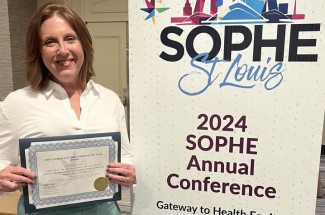UK Martin-Gatton CAFE study on food insecurity receives ‘Paper of the Year’ award

A University of Kentucky Martin-Gatton College of Agriculture, Food and Environment (CAFE) study researching Appalachian culture and its impact on food insecurity has won Health Education & Behavior’s “Paper of the Year” Award for 2023.
The paper, titled “Exploring Food-Based Cultural Practices to Address Food Insecurity in Rural Appalachia,” emphasizes how significant culturally entrenched food practices are in enabling communities from Appalachia to fight food insecurity. The study was led by Lauren Batey and co-authored by Emily DeWitt, Dawn Brewer, Kathryn Cardarelli and Heather Norman-Burgdolf.
The recognition from Health Education & Behavior was unexpected for Batey and her team. The journal selects one paper each year based on its research quality, relevance to public health and potential to impact the field.
“We were surprised and honored to receive this award. It wasn’t something we applied for, so it was a pleasant shock when we found out,” Batey said.
This research, which evolved from Batey’s master’s thesis, focused on how Central Appalachian communities, especially in Eastern Kentucky, use long-standing cultural practices to address the challenge of limited food access. Appalachia, a region long plagued by poverty, inadequate access to healthy food and high rates of chronic disease, has been grappling with food insecurity for generations. The study revealed that despite these challenges, cultural practices like gardening, canning and hunting remain essential to the community’s ability to meet their needs.
“I’ve always been drawn to Appalachian culture, and as I looked deeper into food insecurity, it became clear how much culture influences how people respond to challenges,” Batey said. “Our research showed that although community members may not think of their actions as direct responses to food insecurity, their traditional practices are, in fact, key to addressing it.”
The research was conducted in Martin County, a small rural Appalachian community facing economic hardship, geographic isolation and persistent health challenges. The study’s purpose was to recognize how local food traditions are embedded in Eastern Kentucky culture and how these practices might be used to improve food security.
One of the most intriguing findings from the study was the community’s unique sense of resilience.
“People in Appalachia take pride in their self-sufficiency, but it’s not just about individual survival — it’s about working together as a community to get by,” Batey said. “The sense of shared responsibility is what makes these communities so strong.”
Batey stated the research offers valuable insights for those designing programs to tackle food insecurity in rural regions. By recognizing and incorporating the cultural practices already in place, public health initiatives can be better tailored to meet the specific community needs.
“Too often, health programs overlook the local traditions, but this research shows that communities in Appalachia are already addressing food insecurity in ways that reflect their traditions and values. By building on those strengths, future programs can be much more effective,” Batey explained.
The study found that nutrition education programs in the region can benefit from promoting traditional food procurement practices such as gardening and hunting. Local initiatives like the Kentucky Nutrition Education Program, which includes recipes using wild game and home-grown produce, are already showing success in helping families prepare nutritious meals that fit within their cultural norms.
“We hope this study encourages others to look closely at the cultural practices within communities and understand how they can play a vital role in addressing food-related challenges,” Batey said.
While this study contributes significantly to understanding food insecurity in Appalachia, Batey sees opportunities for future research and intervention.
“We’ve only scratched the surface in terms of understanding how cultural practices can help tackle food insecurity,” she said. “There’s so much more to explore, especially regarding how we can work with communities to build on these traditions in ways that improve health outcomes.”
This project was supported by the Centers for Disease Control and Prevention (CDC) of the U.S. Department of Health and Human Services (HHS) as part of an award totaling $500,000 with 0% financed with nongovernmental sources. The contents are those of the author(s) and do not necessarily represent the official views of, nor an endorsement, by CDC, HHS, or the U.S. Government. For more information, please visit CDC.gov

